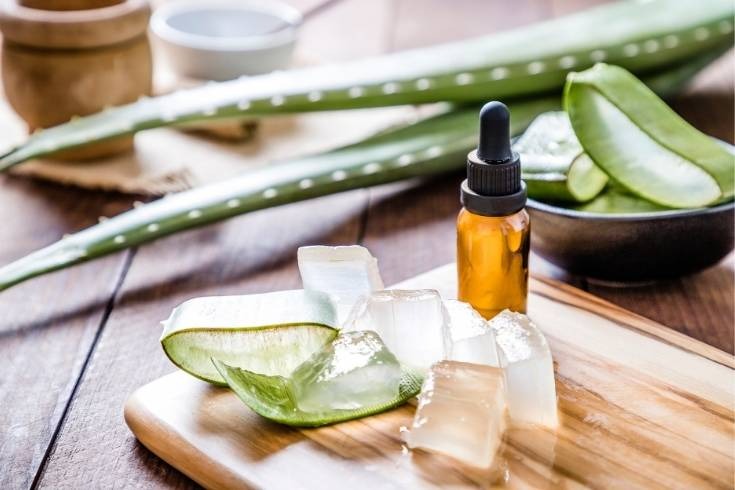Do the sounds of your dog’s itching and scratching regularly wake you up? It may drive you crazy, but imagine how miserable your dog is. If the scratching is mild, you can try some of these vet-approved home remedies before making an appointment with your dog’s veterinarian. When our puppies are itchy, it makes us feel bad for them. You probably already have everything you need to treat these common ailments. Canvas Personalized lists the best ways and all the information you need to know about home remedy for itchy dog skin.
Common Causes of Your Dog’s Itchy Skin
Consider the underlying cause of your dog’s itchy skin before applying any treatment. Knowing the cause will help you select an appropriate treatment. It will also let you know if you need to visit a veterinarian to get the problem treated with drugs, vitamins, or all-natural topical remedies. We will go through the most common reasons dogs scratch and how you can treat home remedies for itchy dog skin.
1. Rashes

Many things can cause skin irritation, so checking for redness and feeling for hot areas on your dog’s skin is important. Discuss the rash with your dog’s vet to find out what’s causing it. Get effective medication if treatment is necessary.
2. Fleas

Fleas are a major contributor to canine skin irritation. Flea bites can trigger a severe reaction in the skin. Getting rid of the fleas is essential if you want the itching to stop for good after treatment.
3. Mites

According to the Merck Veterinary Manual, a healthy animal’s skin can become infected with mites, which are minute creatures that cause inflammation, hair loss, and discomfort. Mites are the cause of mange’s symptoms, which include hair loss and crusty sores. Mites are extremely contagious. Therefore, you should try conventional medical treatment first.
4. Allergies to Skin

Skin irritation is a common symptom for allergy sufferers. There are a wide variety of potential allergens, including:
- Canine food
- Seasonal allergies
- Shampoo or other topical treatments (ointments, sprays, etc.) for canines
- A skin condition in your dog could result from an allergy if you suddenly change his diet or routine.
5. A Skin Irritation

Licking, topical products, and injuries are all potential causes of irritated skin. After ruling out other medical issues, a pet may be left with itchy skin.
6. Candida Overgrowth

Dogs frequently develop yeast infections, especially in skin folds (such as those seen in the neck, between the paws, and the groin). A musty or cheesy odor may accompany the symptoms of red, irritated, itchy, and flaky skin. Yeast infections can result in both ear infections and hair loss.
Home Remedy For Itchy Dog Skin
1. Baths with Herbal Tea

Green tea’s anti-inflammatory and cooling characteristics make it a great complement to a bath for your dog. Hot, itchy areas on a dog’s skin benefit most from these soaks.
Put your dog in a tub full of warm water and add several tea bags to steep for three minutes to create an herbal tea bath. Take the tea bags and give your puppy five minutes in the tub.
You can also try steeping one or two tea bags in smaller, itchy areas around two glasses of hot water. When it has cooled, apply it directly to your dog’s skin and let it air dry; there’s no need to rinse.
2. Apple Cider Vinegar

You can’t go wrong with apple cider vinegar as the best home remedy for itchy dog skin. Try using apple cider vinegar if your dog’s skin is dry and irritated. Apple cider vinegar’s antibacterial and antifungal properties make it a wonderful remedy for irritated skin. But if the skin is raw or otherwise broken, you shouldn’t use this cure. A cut or scrape will feel the sting of apple cider vinegar.
The acetic acid in apple cider vinegar can kill germs and yeast. Spray the afflicted regions of your dog’s skin with half vinegar and half water. If your dog has itchy paws, you can use this solution to soak them. However, apple cider vinegar can sting and irritate your dog’s skin if applied directly to an open wound.
3. Oatmeal Soak

Dry, itchy skin has long been treated with oatmeal. Use colloidal oatmeal to give your dog a relaxing bath. Colloidal oatmeal adheres to the skin, creating a barrier that prevents moisture loss. It has anti-inflammatory properties and aids in moisture retention.
Colloidal oatmeal in warm water is a great way to relax your dog. Regular oatmeal is non-toxic, so you don’t have to worry about it injuring your dog while you try to relieve itching and allergy symptoms.
4. Vitamin E

Vitamin E oil is widely available and may be bought at any drugstore or health food store. Your pet’s skin wounds will heal more quickly if you apply the oil directly. Applying the oil to dry skin areas can help soothe and hydrate the skin.
Vitamin E is a powerful antioxidant that can protect the skin from harmful free radicals. Your dog’s immune system, heart, and liver will all benefit from this, as will his or her skin and coat.
5. Calendula

The sunflower family plant known as calendula has anti-fungal qualities and aids in skin healing and pain relief. These flowers are effective for treating a variety of skin irritations, including eczema and flea bites.
Bring one quart of water to a boil, then add a handful of dried calendula flowers. Boiling water should be added to 1/2 cup of dried calendula flowers. Remove from heat, cover, and let the flowers steep while it cools. When the rinse is cool, you can use it. Use a sponge or spray bottle to apply the solution liberally to the affected regions, then let it dry naturally.
6. Epsom-Salt Baths

The magnesium and sulfate in Epsom salt have long been used to treat the itching of allergic dermatitis. Your dog may have less itching and inflammation if it regularly soaks in Epsom salt water. See your vet if you want to bathe your dog in Epsom salts but aren’t sure how to do it safely.
7. Vera Aloe

Are you looking for a traditional home remedy for itchy dog skin? Soothing itchy skin with aloe vera is one of the best options. Some skin irritation will subside as the itching ends, and your dog stops licking or scratching. You may help your itching dog without worrying that it will get sick if it licks at the area treated with pure aloe vera gel because it is non-toxic.
8. Extra Virgin Olive Oil

Put some of your preferred oil in your dog’s food. While olive oil is excellent for cooking, it also contains antioxidants and vitamins E and K that can rehydrate your dog’s coat. Add a tablespoon of olive oil to your dog’s diet twice or three times a week. This supplement will not only assist your dog’s fur in becoming thick and lustrous, but it will also help alleviate the itching that’s been driving your dog crazy.
9. Coconut Oil

Dogs with skin allergies or dermatitis can greatly benefit from using coconut oil. Insect bites and fleas could be alleviated for your dog as well. If you want to keep your dog safe, only give him or her coconut oil labeled as unrefined or virgin. It can be applied topically to the skin or orally to improve your dog’s diet. Before putting anything into your dog’s food, make sure it’s okay with your vet.
10. Plain Yogurt Without Sugar

Dogs can gain many health advantages from plain, unsweetened yogurt. Your dog’s digestive system may be the source of various yeast infections and skin irritations. This treatment is helpful for canine skin conditions such as hives, rashes, and allergies.
It’s best to get your vet’s approval before giving yogurt to your dog. Make sure there are no artificial sweeteners in the yogurt, especially xylitol. For dogs, especially, xylitol can be fatal.
11. Baking Soda

Baking soda is a useful ingredient for more than just adding flavor to baked goods. Baking soda can dry out skin rashes, relieve itching, and reduce redness and inflammation when mixed with water to form a thick paste.
Simply mix a paste of baking soda and water (equal parts of each) and apply it to your dog’s irritated skin. A full rinse is recommended after around 20 minutes. Put in a few drops of high-quality coconut oil to hydrate the blend.
12. Healthy Eating Diet

One of the best ways to treat home remedies for itchy dog skin is to alter their diet. Chicken, beef, and/or wheat or gluten are just a few of the substances in dog food that might cause allergic reactions in some dogs. Itchy skin is a common symptom of allergies.
If you suspect your dog has food allergies, an elimination diet might help you pinpoint the offending substances and find safer alternatives. Changes to your dog’s food or the addition of additional supplements require veterinary approval.
13. Omega-3

If your dog has red areas, these components will help alleviate inflammation and speed healing. In addition to promoting a balanced diet, these components help alleviate allergy symptoms, calm irritated skin, and ease joint pain.
Typically, omega-3 fatty acids are given orally, either as a treat or as a pure oil. Many commercial dog diets contain beneficial nutrients such as fish oil, hemp oil, flaxseeds, pumpkin seeds, soybean oil, lecithin, currant oil, and borage oil.
How to Get Rid of Itchy Skin on Your Dog
A veterinarian’s examination is necessary to diagnose your dog’s ailment, but in the meantime, these self-care measures may make your pet feel better.
Ditch The Shower
Use only water and a good, non-drying solvent when bathing your dog. Use a shampoo formulated for dry hair, then follow up with a conditioner formulated for dry hair if you must use shampoo.
Don’t use Blow Dryers
If you take your dog to get groomed, remind the groomer to tone down the heat on the blow dryer.
Soupy Food
Dogs with dry, itchy skin benefit from wet food, such as canned, prepared, homemade, or raw varieties. Because of the higher water content of moist diets, they are better for maintaining your dog’s hydration and skin health.
Enzymes for Digestion
Some dogs with itchy skin may find relief with probiotics, which are digestive enzymes. The inflammation that might cause itchy skin may be alleviated by taking probiotics. Try to take 2–10 billion CFUs of probiotics daily.
Hydration
The itching of your dog’s skin can be relieved, and their hydration maintained with fresh, filtered drinking water.
When Should I Take My Pet To The Vet?

In most cases, occasional mild itching is not a sign of a significant medical issue. Still, it’s cause for concern if your dog exhibits signs like depression, loss of appetite, excessive licking, difficulty getting comfortable, restlessness due to itching, or difficulty getting up. Seeing your adorable puppy suffer this way can be distressing, so it’s critical to provide your dog with the relief it requires as soon as possible.
The vet may recommend oral medications, medicated shampoos, prescription ointments, or other pharmaceuticals and/or therapies to alleviate the underlying cause of the itch and soothe the irritated skin.
>>> Maybe you’re interested in:
- 26 Common House Plants Poisonous To Dogs You Should Avoid
- Cleaning Dog’s Ears At Home: 9 Easy Steps You Need to Know
- Top 10 Common Corgi Health Problems and How To Prevent Them
A dog’s excessive itching is no joke. Itchy skin, severe scratching, and other allergy symptoms are common in dogs. Seeing your beloved dog suffer like this is upsetting, so providing the help they require is crucial. If the above home remedy for itchy dog skin doesn’t work, talk to your vet about further options. Many can be treated using chemicals readily available at most drugstores. Your dog will recover faster if you get started right away.










